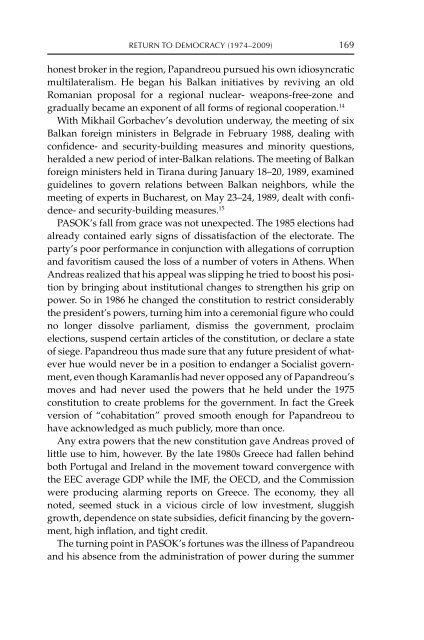MODERN GREECE: A History since 1821 - Amazon Web Services
MODERN GREECE: A History since 1821 - Amazon Web Services
MODERN GREECE: A History since 1821 - Amazon Web Services
Create successful ePaper yourself
Turn your PDF publications into a flip-book with our unique Google optimized e-Paper software.
RETURN TO DEMOCRACY (1974–2009) 169<br />
honest broker in the region, Papandreou pursued his own idiosyncratic<br />
multilateralism. He began his Balkan initiatives by reviving an old<br />
Romanian proposal for a regional nuclear- weapons-free-zone and<br />
gradually became an exponent of all forms of regional cooperation. 14<br />
With Mikhail Gorbachev’s devolution underway, the meeting of six<br />
Balkan foreign ministers in Belgrade in February 1988, dealing with<br />
confidence- and security-building measures and minority questions,<br />
heralded a new period of inter-Balkan relations. The meeting of Balkan<br />
foreign ministers held in Tirana during January 18–20, 1989, examined<br />
guidelines to govern relations between Balkan neighbors, while the<br />
meeting of experts in Bucharest, on May 23–24, 1989, dealt with confidence-<br />
and security-building measures. 15<br />
PASOK’s fall from grace was not unexpected. The 1985 elections had<br />
already contained early signs of dissatisfaction of the electorate. The<br />
party’s poor performance in conjunction with allegations of corruption<br />
and favoritism caused the loss of a number of voters in Athens. When<br />
Andreas realized that his appeal was slipping he tried to boost his position<br />
by bringing about institutional changes to strengthen his grip on<br />
power. So in 1986 he changed the constitution to restrict considerably<br />
the president’s powers, turning him into a ceremonial figure who could<br />
no longer dissolve parliament, dismiss the government, proclaim<br />
elections, suspend certain articles of the constitution, or declare a state<br />
of siege. Papandreou thus made sure that any future president of whatever<br />
hue would never be in a position to endanger a Socialist government,<br />
even though Karamanlis had never opposed any of Papandreou’s<br />
moves and had never used the powers that he held under the 1975<br />
constitution to create problems for the government. In fact the Greek<br />
version of “cohabitation” proved smooth enough for Papandreou to<br />
have acknowledged as much publicly, more than once.<br />
Any extra powers that the new constitution gave Andreas proved of<br />
little use to him, however. By the late 1980s Greece had fallen behind<br />
both Portugal and Ireland in the movement toward convergence with<br />
the EEC average GDP while the IMF, the OECD, and the Commission<br />
were producing alarming reports on Greece. The economy, they all<br />
noted, seemed stuck in a vicious circle of low investment, sluggish<br />
growth, dependence on state subsidies, deficit financing by the government,<br />
high inflation, and tight credit.<br />
The turning point in PASOK’s fortunes was the illness of Papandreou<br />
and his absence from the administration of power during the summer


